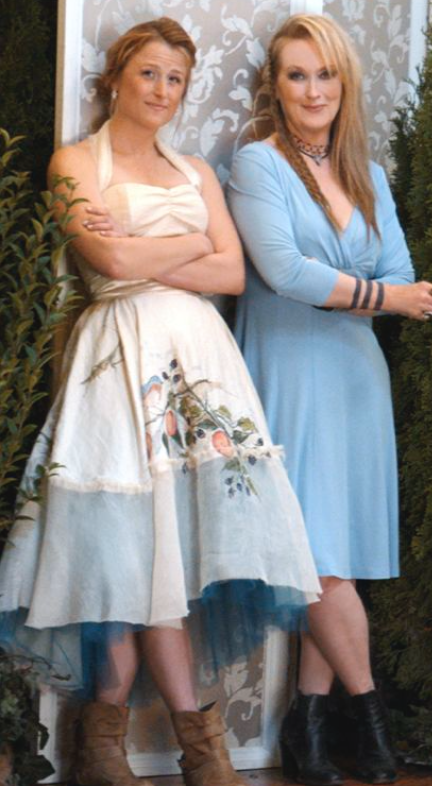 It’s hard not to get excited about “Ricki and the Flash.” It stars Meryl Streep in what is amazingly a new kind of role for her. It is directed by Jonathan Demme, who has been charming the pants off us since his 1984 Talking Heads documentary “Stop Making Sense.” And it is written by Diablo Cody, whose script for “Juno” (2007) set the bar for witty teen-pregnancy movies everywhere. (Let’s hope that genre doesn’t become too much of a cinematic trend moving forward.) But rather than being an embarrassment of riches, this musical dramedy suffers from too much of a good thing – namely, too much of its titular character at the expense of any true plot or supporting character development. The problem can be traced back to Cody, who may be a better memoirist than screenwriter.
It’s hard not to get excited about “Ricki and the Flash.” It stars Meryl Streep in what is amazingly a new kind of role for her. It is directed by Jonathan Demme, who has been charming the pants off us since his 1984 Talking Heads documentary “Stop Making Sense.” And it is written by Diablo Cody, whose script for “Juno” (2007) set the bar for witty teen-pregnancy movies everywhere. (Let’s hope that genre doesn’t become too much of a cinematic trend moving forward.) But rather than being an embarrassment of riches, this musical dramedy suffers from too much of a good thing – namely, too much of its titular character at the expense of any true plot or supporting character development. The problem can be traced back to Cody, who may be a better memoirist than screenwriter.
Streep stars as Ricki, who fronts a cover band in Tarzana, California, and ekes out a living as a Whole Foods cashier. With her still-good gams (since when are Streep’s legs so fine?), semi-cornrowed mane, kohl-lined eyes, and reams of silver jewelry, she’s the spitting image of a woman who refuses to sacrifice her dreams even when they’ve sacrificed her. Ricki abandoned her family decades before so she could pursue a rock and roll career that never took off. But when daughter Julie (real-life daughter Mamie Gummer, who needs to stop working in Mommy’s shadow) has a nervous breakdown, Ricki grudgingly steps up to the plate, though she’s not entirely welcome in the Indianapolis McMansion of ex-husband Pete (a sweater vest-clad Kevin Kline) and his tightly wound wife, Maureen (Audra McDonald), who raised Ricki’s three kids.
For all those accolades, Streep doesn’t get her due as a skilled comic actress, and she revels in Ricki’s inconsistencies with expertly timed double takes and cocked eyebrows. Cody, who based the character on her own mother-in-law (a longtime rocker who did not abandon her family), has constructed a beautifully complex woman – a 1970s counterculture siren with a retrogressive chip on her shoulder. (Literally. Check out the Tea Party tattoo on her upper torso.) Her sons are repelled by Ricki, especially gay Adam (Nick Westrate), who bears the brunt of those dated Baby Boomer biases of hers. But Julia tolerates her, since she could use a walk on the wild side to shake out those suicidal ideations, and both Pete and bandmate Greg (Rick Springfield, decked out in matching eyeliner) pine for Ricki’s growly charisma though she’s ambivalent about their attentions.
When Maureen returns from tending to her ailing father, she chases Ricki off, who returns to Tarzana with tail not-so-neatly tucked between her legs. That’s the whole banana until she scores an invitation to the nuptials of other son Josh (Sebastian Stan) – a twist that feels tacked on as a softball for Demme, who can stage a wedding like nobody’s business.  (See “Rachel Getting Married” immediately if you have not already.) In general, plotlines and supporting character arcs are abandoned here with a carelessness that may surprise anyone unaccustomed to this screenwriter.
(See “Rachel Getting Married” immediately if you have not already.) In general, plotlines and supporting character arcs are abandoned here with a carelessness that may surprise anyone unaccustomed to this screenwriter.
I’d never really seen the appeal of Cody’s work until I went back and read her 2005 memoir, Candy Girl: A Year in the Life of an Unlikely Stripper. Though I’d expected to be turned off by the cooler-than-thou prose, it is a genuinely clever account of a nerd’s efforts to mix it up. But it also clarifies that this is a woman who glories in the first person, in the liberation afforded by a single-perspective narrative – which isn’t exactly an ideal quality in a screenwriter. Cody’s solution, however unconscious, is to create a uniform narrative voice in each film. Hence, everyone in “Juno” sounds like Ellen Page’s culturally savvy quipster, and everyone in the Cody-penned “Young Adult” radiates the misanthropic ennui of the narcissistic beauty played by Charlize Theron. What makes “Ricki and the Flash” Cody’s worst misstep so far is that, while it fails to acknowledge the reality of anyone or anything outside of Ricki, it offers very little insight into what makes this woman tick, either. (Come to think of it, Candy Girl also offered little in the way of true self-revelation.) Couple this deficiency with Streep’s long-unacknowledged selfishness – the perpetually stunned expressions of her costars stem from how she acts at rather than with them – and we’ve got a narrative flaw even the sweetly mise-en-scèney Demme can’t transcend. At a certain point, I think he ceased to even try. Insert the endless musical numbers padding out this 102-minute film. Sure, it’s amazing how well Streep sings and plays the guitar but one can only exclaim “What can’t this woman do?” so many times. The not-so-prodigal mom comes home, indeed.
This was originally published in Word and Film.
